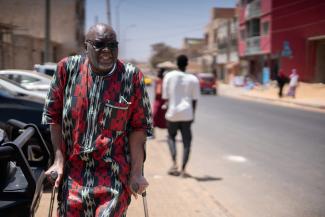Advancing the role of people with disabilities for a more robust democracy
Disabled people in developing countries face difficulties accessing public services, including hospitals and schools, moving around and finding jobs to sustain themselves. A significant obstacle in Senegal is access to education. It is estimated that 66 percent of children with disabilities between the ages of 7 and 16 are not enrolled in school.
Teachers are reluctant to serve them, many parents underestimate their children's abilities, and public policies don't take enough measures for inclusive education. They are also less likely to participate in the decisions that ultimately affect them. Without education, children's ability to secure a better future for themselves and their communities is threatened.
Oumar Diop is a Senegalese man admired by many for his courage and outstanding achievements despite his disability. He contracted polio at the age of three, and due to medical malpractice, Oumar lost the use of his right leg. While many families in Senegal deprive their children with disabilities of a normal life, his mother put her resources and energy behind her son's recovery and integration.
"I had many medical treatments and five fractures in my leg. Still, I went to school with all the other kids. There were no special accommodations for me, and with each school year, I needed to climb more and more steps to go to class."
"That didn’t stop me, and I even played soccer. With the help of my cane, I was a good defender!"
As time went by, on the long road from home to high school by foot, Oumar met a disabled man who worked at L'Association des Handicapés. That man saw him as an educated young man who could become an advocate for his community.
"That's how I started a career that has allowed me to serve as spokesperson for people with disabilities in the country," he recalls. "I have seen how civil society's role increased during the 2012 elections, the 2016 referendum, and the 2019 elections, but much remains to be done," he adds.
For over ten years, Oumar Diop has been a leader in a movement that advocates for the rights of people with disabilities in Senegal. He has also worked in partnership with several USAID activities to help improve the situation of his community in the country.
Since 2012 Oumar Diop has worked with Collectif des Organisations de la Société Civile pour les Élections (COSCE) to help develop inclusion activities. With USAID and COSCE, Oumar led efforts to increase the participation of disabled people in the electoral processes. This included mobilizing voters with disabilities to collect their voter cards and exercise their right to vote.
One of the people he has touched with his activism is Coumba Ndiaye, a disabled single mom with a daughter who works at a Dem Dekk bus selling tickets. She recently got reelected municipal councilor of Malika, where she makes sure disabled people have a place at the table.
"I call him my best president. He has accompanied my development as a politician," confides Coumba.
"Thanks to my role in the municipality, the mayor considers our needs when renovating our health center, for instance. A disabled person was also hired as an electrician to ensure the community's power system was always up and running. That would have never been considered before!"
"We continue to ensure that more people from our community can participate in civic life. This can be through their vote or as elected officials. This is how we can achieve equal opportunity," says Oumar Diop.
With the current USAID Election Support activity, Nietti Elections, Oumar will continue working to empower disabled people to participate in their communities, the legislative and presidential elections, and political life.
The road is still long and not always accessible in Senegal. Still, with heroes like Oumar Diop and Coumba Ndiaye, the path is unbreakable and full of determination and hope.
For over 60 years, USAID has worked with heroes like Oumar and civil society organizations like COSCE to engage in their community's civic life and advocate for people from all backgrounds, including women, youth, and people with disabilities.
For more pictures of this story go to: https://usaidsahel.exposure.co/working-with-heroes?source=share-usaidsahel

Olivier Le Blanc/USAID
